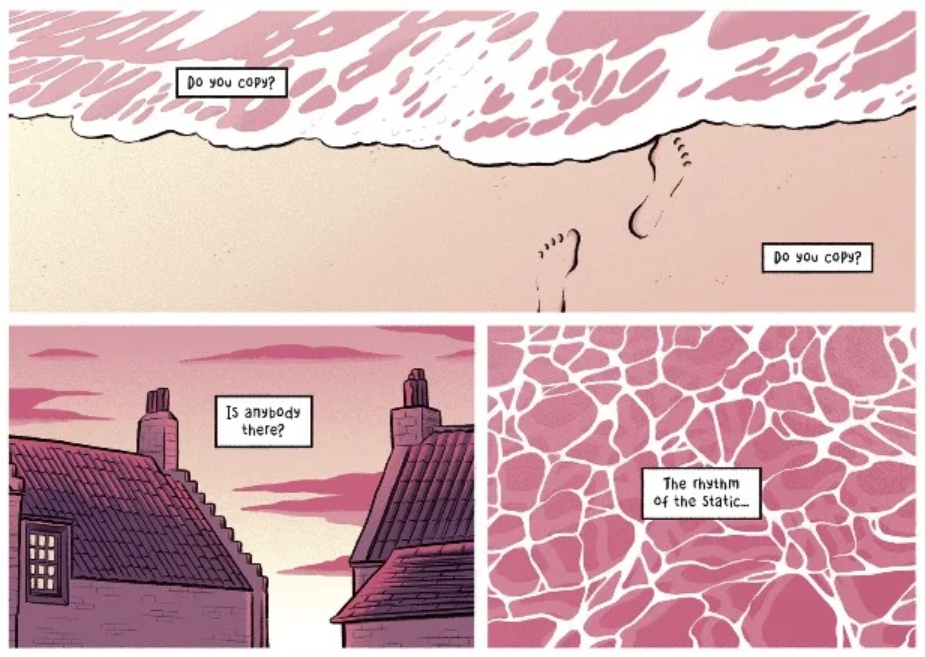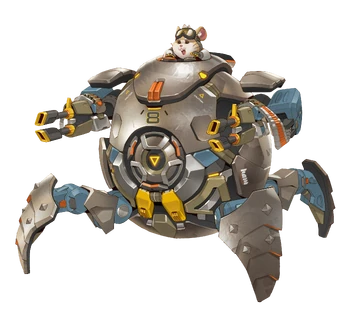Let’s look at three recently published poems from three different authors and three different online journals. I’ve picked: ‘Heirloom’ by Phillip Crymble, published in issue 13 of Bad Lilies; ‘How to Tank in Overwatch 2‘ by Sara Hovda, published in Cartridge Lit; and ‘Static’ by Chrissy Williams and Tom Humberstone, published in issue 3 of COMP, an interdisciplinary journal.
Is there anything linking these poems? After a short ponder, I thought: something to do with loss, moving forward, having to leave those we love behind. Williams and Humberstone’s ‘Static’, a poem-comic hybrid, gestures to the passing of time constantly, through the images of tidal movement which serve as a backdrop to the words. The speaker has lost touch with seemingly everyone else; they are positioned as a lone radio operator in the opening lines:
Do you copy?
Do you copy?
Is anybody there?
At or around the mention of living in ‘a digital age’, however, the implication is that it is communication technology itself (symbolised by the phone with its redundant/unused compass) which is the cause of this loneliness. The concept of radio and televisual static is married to the texture and sound of the sea through the panel layout, and right at the beginning we see footprints in the sand, leading into the swash.

Meanwhile, the lit windows of the houses on the shore evoke the glow of smartphone screens; there is human life here, but over time it has been absorbed, or drowned, in the rolling, roaring and splintering of the waves — and in digital interference. “I am all repetition and control,” says the speaker, mourning (it seems to me) a loss of intimacy, and the spontaneity born of it.
I’m not sure I can make the same case for these themes turning up in the other two poems, but here goes. ‘How to Tank in Overwatch 2” also mourns a loss, in the lines “Oh, to be a man / again and take up so much space” and “If only I could hold your hand / through the gunfight”, the latter even alluding to lack of intimacy. The march of time is implied by “There is nowhere to run / except forward”. So here we have a speaker forced to move forward (in time) but unable to take others with them. Those others are certainly in danger of becoming lost, as established in the second stanza:
The bullets kiss the air
beside my ear. Each whispers
the name of its target, a lover.
A short explanation of the title and the clever metaphor at the heart of this poem: Overwatch 2 is a team-based shooter, and ‘tanking’ means to play the role of the tank in your team. The tank’s job is to soak up enemy gunfire with their superior armour and health, protecting weaker allies (such as healers). They do this by making themselves a target, planting themselves in an obvious position — in other words, by conspicuously taking up space. Hovda is mapping this directly on to the role of cis male allies in social justice activism. By taking/holding/creating space in a zone of conflict, they draw fire, which “means we can bring / others with us” — establish a safe passage for those more vulnerable to aggression.
As I read this poem, then, the speaker recalls being a man and being able to perform this protective function. Now, however, they are “a hamster / in a giant metal ball”; this is both a reference to Hammond, one of the tank characters in Overwatch 2 (yes, he is literally a cartoon hamster driving a ball-shaped futuristic tank) and an image of confinement, of being something soft and squishable in a hard shell — someone in possession of a complex and implausible identity.

Hovda is trans, so the biographical reading is the most obvious one, but the idea of no longer being the man one once was could equally apply to any maturing or unravelling of selfhood. We might even understand it as referring to the broader loss of traditional gender roles and subsequent ‘crisis of masculinity’. If Williams and Humberstone are concerned with what happens when rituals of technological navigation separate us from one another, Hovda is scratching at what it means to be separated from former identities that no longer fit, how that impacts our ability to support each other.
I’ll admit that when reading Crymble’s ‘Heirloom’ I jumped straight to the theme of loss because of the words ‘My father’. “Oh, here we go,” I thought, “it’s about to turn into a eulogy.” But I was wrong; the father only has a bit-part. The focus is on the object described in the opening stanzas: an expensive quartz watch. I should have been tipped off by the fact the poem is titled ‘Heirloom’ but concerns an item which the speaker finds in a pawn shop (well, technically in a K-Mart, but the implication is that it was traded in). This isn’t a poem about inheritance; it’s about imbuing something with value through a combination of its unlikeliness, the work undertaken to bring it into being (or, in this case, possess it), and the time you have spent with it.
I read this, in fact, almost as a rejection of the logic that imbues an heirloom (and, by extension, tradition itself) with value. It suggests that what we have in our lives now, what we have made for ourselves (albeit out of the heaps of stuff that surround us), can be as precious as that which is, or has been, passed on. This is a refreshing line of thought in a culture which is at times unhealthily fixated on lineage and legacy. The speaker is aware of the impermanence of the arrangement, of course —
I wear it to this day. The inner bezel
indices occluded now, the sub-dials stuckunzeroed on its face.
— but this only makes it more of a treasure. We might think this as well of those relationships we have in life that must come to an end, and ultimately be lost.
Incidentally, there’s a lovely formal trick in this poem: each of the first six lines contains a brand name (‘Podunk’ is the impostor by dint of its initial cap). The Seiko watch is sitting amongst these other names just like an item on a crowded shelf which you don’t notice at first. Indeed, I had to stop and go back to the start at least once in order to pick out this particular object as the ‘heirloom’ of the title, since I’d got lost in the dazzle of Pulsars/Nelsonics/Rolex Oyster.
So here we have three poems which could be said to speak, in different ways, of vulnerability in the face of change, let’s say. The experiences recounted in each of them must be broadly known to each of us: the static that overtakes our ability to stay in touch, the desire to be able to keep open a space in the world for those we care about, and the importance of the little which we’re able to hold onto for more than a moment. ‘Static’ ends with the lines “I believe in absence / where hope lives”, set against images of spray dispersing before the black silhouettes of houses. In the context of the poem, this refers to a pause in the frenzy of interference, but it relates as well to the remaining gaps in the enemy’s suppressive fire, and to the ‘sheer mistake’ that leads to a teenager with a paper round acquiring a vintage timepiece. Space, absence, that which is not quite filled in — this is where we can get a fingerhold. It’s a variation on that very famous line by Leonard Cohen — you know the one.
This article is part of my attempt to put my money where my mouth is. I believe one of the biggest threats to art and culture — and to the very real social function it serves — comes from the lack of sustained attention given to most of what is made and published. By that I don’t just mean that we obsess over a few big success stories to the detriment of all else, but that we’ve retreated to a position where we produce, promote and applaud, produce, promote and applaud, rarely stopping to draw connections, to deepen and share our understanding. This is in line with the more general atomisation of society, which leads increasingly to each of us, as individuals, feeling unnoticed, disconnected. I’ve written a longer ‘minifesto’ about this here. Thanks for reading!